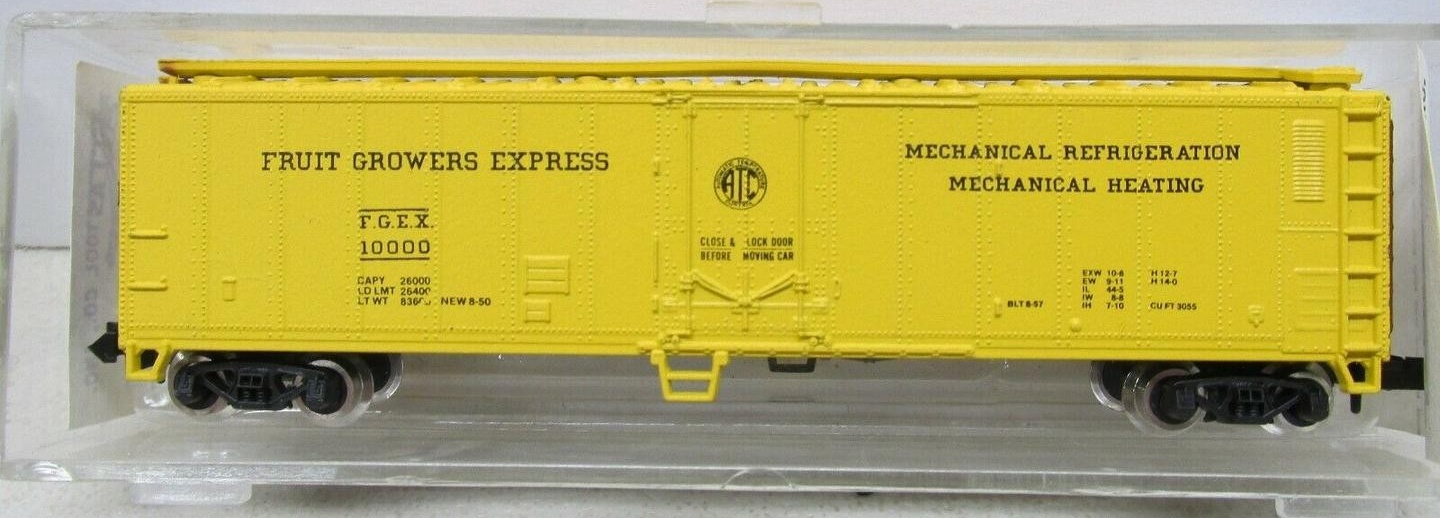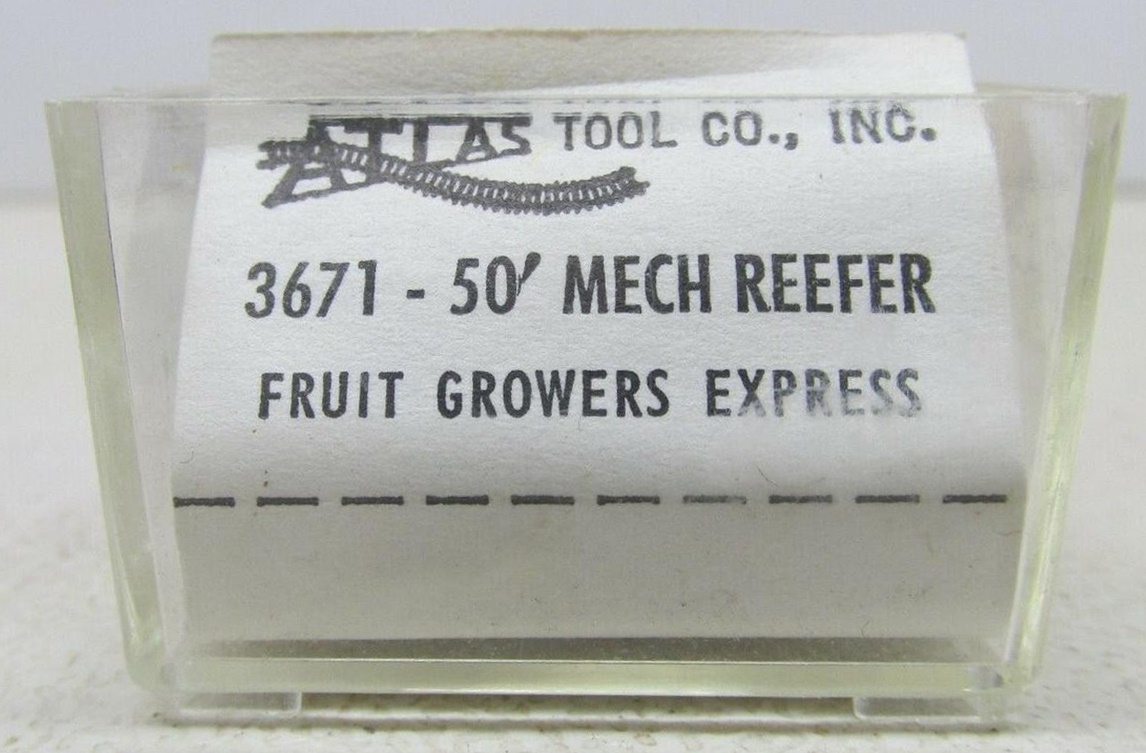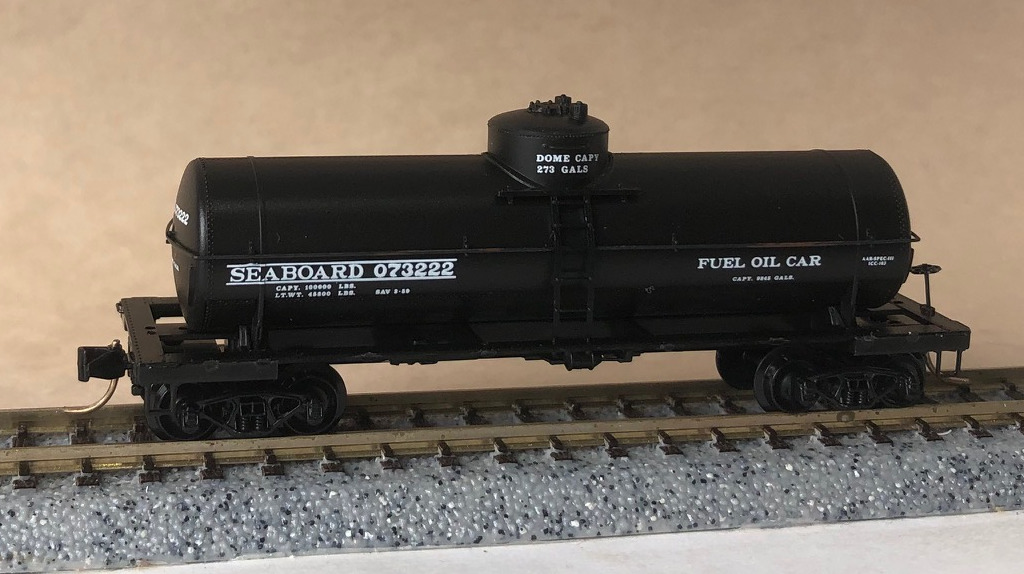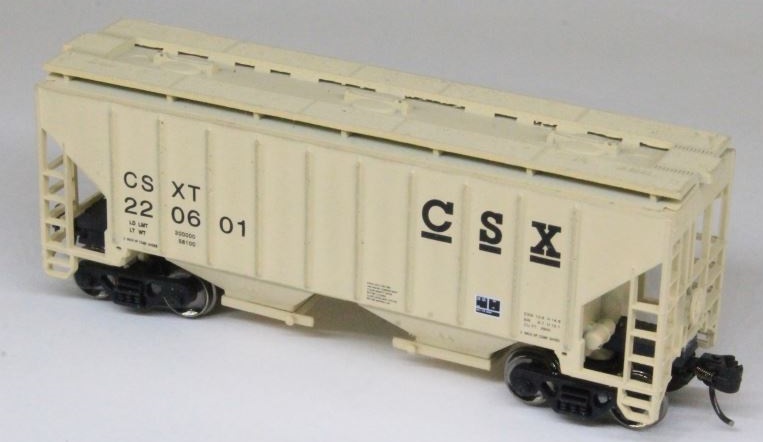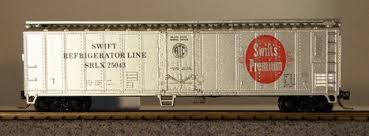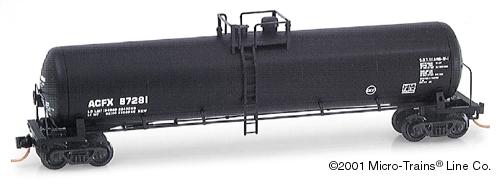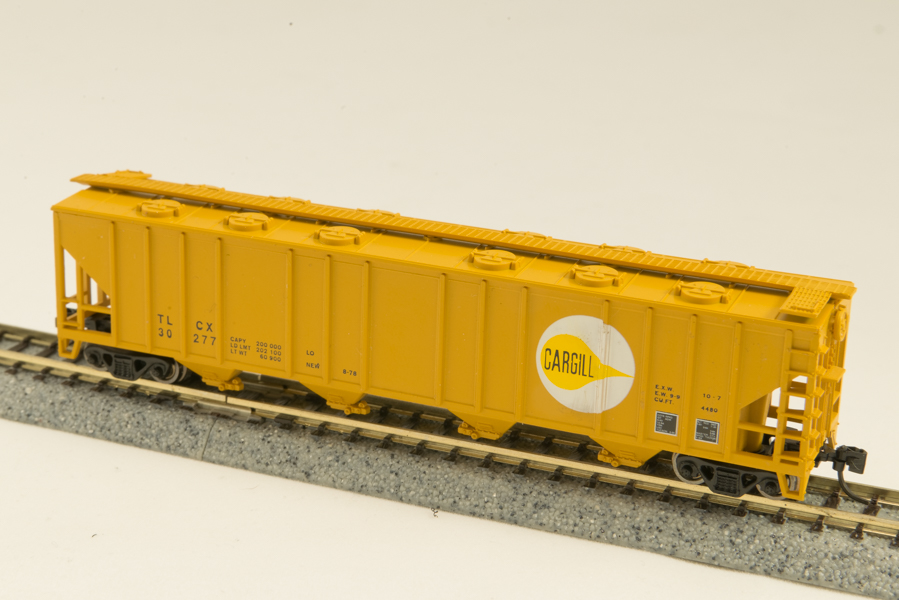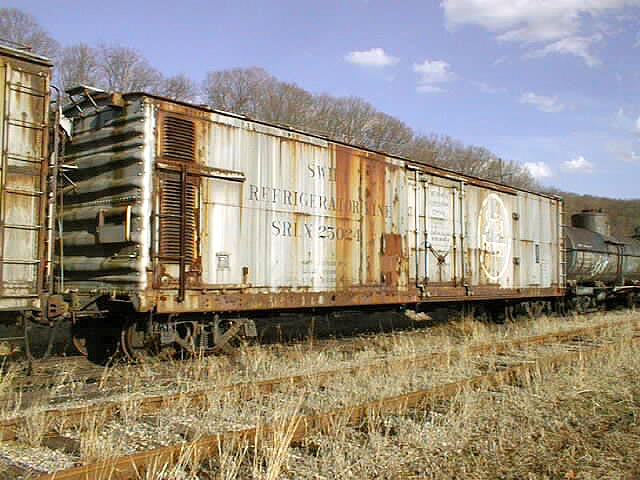Specific Item Information: Atlas USA molded on car underframe. This item shares a product ID (MPN) with an Shorty Tank Car also from Atlas.
Price is listed as new in 1991 Walthers N&Z Reference Book
Model Information: Apparently dissatisfied with the Roco-produced 50 foot mech reefer from 1969, Atlas made a completely new tooling in 1975. This new version featured riveted sides (the Roco version had rib sides). The tooling was moved to China in the 1990s along with all their other molds and production. By December 2006, this tooling was a bit long in the tooth and Atlas reclassified the model and continued production under the Trainman® line.
Four of the early reefers in this sequence (3241, 3242, 3243 and 3244) do not seem to appear in any of the 1970s Atlas catalogs, but they definitely exist. Apparently Atlas was having some serious numbering issues with these reefers. The first four 3241..3244 (at least I think they were the first four) were assigned MPN's that had already been used for their Shorty Tank cars. Then they mis-numbered the 1978 catalog listings as 3551... which apparently was a catalog error, because no such reefers exist. Atlas finally settled on 3651... which is what *most* of the earliest releases used (the original 4 being the exception) and the 1980 catalog is corrected to reflect this. We believe the date of production for these cars was 1975.
This model was also repainted by several of the aftermarket redecorators including Aksarben and Bev-Bel.
Four of the early reefers in this sequence (3241, 3242, 3243 and 3244) do not seem to appear in any of the 1970s Atlas catalogs, but they definitely exist. Apparently Atlas was having some serious numbering issues with these reefers. The first four 3241..3244 (at least I think they were the first four) were assigned MPN's that had already been used for their Shorty Tank cars. Then they mis-numbered the 1978 catalog listings as 3551... which apparently was a catalog error, because no such reefers exist. Atlas finally settled on 3651... which is what *most* of the earliest releases used (the original 4 being the exception) and the 1980 catalog is corrected to reflect this. We believe the date of production for these cars was 1975.
This model was also repainted by several of the aftermarket redecorators including Aksarben and Bev-Bel.
Prototype History: The purpose of a mechanical reefer is to keep perishable items cold. Early reefers were of all wood construction and used ice for cooling. By the 1940s, new reefers were being built entirely of steel. Insulating techniques improved to the point where economical refrigeration could be accomplished using steel side plates in place of wood sheathing. Fifty foot mechanical reefers date back to at least the late 50s / early 60s.
The mechanical reefers could keep a more regular temperature, and often times colder than what the ice bunker cars were capable of. Initially mechanical reefers were used primarily in frozen food service. This would soon change as mechanical refrigeration began to replace ice-based systems. Soon after, mechanical refrigeration units replaced the “armies” of personnel required to re-ice the cars.
The first record of a 50' mechanical refrigerator car with a 6' plug door appears in the October 1954 Official Railway Equipment as with reporting marks FGEX 1000 - 1100. The January 1958 Official Railway Equipment Register lists over 600 of these cars. They appear with road numbers between 1000 and 1600. The build dates will fall between these two dates.
They were first acquired for orange juice service out of Florida. Similar cars were owned by WFEX and BREX. All were used in pool service with one another, depending upon the season. You can find a remaining prototype preserved in the NC Transportation Museum in Spencer, NC.
The mechanical reefers could keep a more regular temperature, and often times colder than what the ice bunker cars were capable of. Initially mechanical reefers were used primarily in frozen food service. This would soon change as mechanical refrigeration began to replace ice-based systems. Soon after, mechanical refrigeration units replaced the “armies” of personnel required to re-ice the cars.
The first record of a 50' mechanical refrigerator car with a 6' plug door appears in the October 1954 Official Railway Equipment as with reporting marks FGEX 1000 - 1100. The January 1958 Official Railway Equipment Register lists over 600 of these cars. They appear with road numbers between 1000 and 1600. The build dates will fall between these two dates.
They were first acquired for orange juice service out of Florida. Similar cars were owned by WFEX and BREX. All were used in pool service with one another, depending upon the season. You can find a remaining prototype preserved in the NC Transportation Museum in Spencer, NC.
Road Name History:  Fruit Growers Express (FGE) was a railroad refrigerator car leasing company that began as a produce-hauling subsidiary of Armour and Company's private refrigerator car line. Its customers complained they were overcharged. In 1919 the Federal Trade Commission ordered the company's sale for anti-trust reasons. The company is now controlled by the CSX Corporation.
Fruit Growers Express (FGE) was a railroad refrigerator car leasing company that began as a produce-hauling subsidiary of Armour and Company's private refrigerator car line. Its customers complained they were overcharged. In 1919 the Federal Trade Commission ordered the company's sale for anti-trust reasons. The company is now controlled by the CSX Corporation.
Incorporated on March 18, 1920 the firm took possession of 4,280 pieces of rolling stock, repairs shops at Alexandria, Virginia and Jacksonville, Florida, and numerous ice plants and other facilities scattered throughout the East Coast on May 1. By year's end, the Chicago and Eastern Illinois, New Haven, and Norfolk and Western railroads became major stockholders.
In order to compete with the Pacific Fruit Express and Santa Fe Refrigerator Despatch in the west, FGE and the Great Northern Railway formed the Western Fruit Express (WFE) on July 18, 1923, a move that added 3,000 cars to the equipment pool. By 1926, FGE had expanded its service into the Pacific Northwest and the Midwest through the WFE and the Burlington Refrigerator Express (BREX), its other partly owned subsidiary (formed in partnership with the Chicago, Burlington and Quincy Railroad (CB&Q) on May 1). That same year, FGE purchased 2,676 36-foot-long (11 m) reefers from the Pennsylvania Railroad.
In February, 1928 FGE formed the National Car Company as a subsidiary to service the meat transportation market. Customers included Kahns, Oscar Mayer, and Rath Packing.
From Wikipedia

Incorporated on March 18, 1920 the firm took possession of 4,280 pieces of rolling stock, repairs shops at Alexandria, Virginia and Jacksonville, Florida, and numerous ice plants and other facilities scattered throughout the East Coast on May 1. By year's end, the Chicago and Eastern Illinois, New Haven, and Norfolk and Western railroads became major stockholders.
In order to compete with the Pacific Fruit Express and Santa Fe Refrigerator Despatch in the west, FGE and the Great Northern Railway formed the Western Fruit Express (WFE) on July 18, 1923, a move that added 3,000 cars to the equipment pool. By 1926, FGE had expanded its service into the Pacific Northwest and the Midwest through the WFE and the Burlington Refrigerator Express (BREX), its other partly owned subsidiary (formed in partnership with the Chicago, Burlington and Quincy Railroad (CB&Q) on May 1). That same year, FGE purchased 2,676 36-foot-long (11 m) reefers from the Pennsylvania Railroad.
In February, 1928 FGE formed the National Car Company as a subsidiary to service the meat transportation market. Customers included Kahns, Oscar Mayer, and Rath Packing.
From Wikipedia
Brand/Importer Information: In 1924 Stephan Schaffan, Sr. founded the Atlas Tool Company in Newark, New Jersey. In 1933 his son, Stephan Schaffan, Jr., came to work for his father at the age of sixteen. Steve Jr. built model airplanes as a hobby and frequented a local hobby shop. Being an enterprising young man, he would often ask the owner if there was anything he could do to earn some extra spending money. Tired of listening to his requests, the hobby-store owner threw some model railroad track parts his way and said, "Here, see if you can improve on this".
In those days, railroad modelers had to assemble and build everything from scratch. Steve Jr. created a "switch kit" which sold so well, that the entire family worked on them in the basement at night, while doing business as usual in the machine shop during the day.
Subsequently, Steve Jr. engineered the stapling of rail to fiber track, along with inventing the first practical rail joiner and pre-assembled turnouts and flexible track. All of these products, and more, helped to popularize model railroading and assisted in the creation of a mass-market hobby. The budding entrepreneur quickly outgrew the limitations of a basement and small garage operation. Realizing they could actually make a living selling track and related products, Steve and his father had the first factory built in Hillside, New Jersey at 413 Florence Avenue in 1947. On September 30, 1949, the Atlas Tool Company was officially incorporated as a New Jersey company.
In 1985, Steve was honored posthumously for his inventions by the Model Railroad Industry Association and was inducted into the Model Railroad Industry Hall of Fame in Baltimore, Maryland. In addition, Steve was nominated and entered into the National Model Railroad Association Pioneers of Model Railroading in 1995.
In the early 1990s, the Atlas Tool Company changed its name to Atlas Model Railroad Company, Inc.
In those days, railroad modelers had to assemble and build everything from scratch. Steve Jr. created a "switch kit" which sold so well, that the entire family worked on them in the basement at night, while doing business as usual in the machine shop during the day.
Subsequently, Steve Jr. engineered the stapling of rail to fiber track, along with inventing the first practical rail joiner and pre-assembled turnouts and flexible track. All of these products, and more, helped to popularize model railroading and assisted in the creation of a mass-market hobby. The budding entrepreneur quickly outgrew the limitations of a basement and small garage operation. Realizing they could actually make a living selling track and related products, Steve and his father had the first factory built in Hillside, New Jersey at 413 Florence Avenue in 1947. On September 30, 1949, the Atlas Tool Company was officially incorporated as a New Jersey company.
In 1985, Steve was honored posthumously for his inventions by the Model Railroad Industry Association and was inducted into the Model Railroad Industry Hall of Fame in Baltimore, Maryland. In addition, Steve was nominated and entered into the National Model Railroad Association Pioneers of Model Railroading in 1995.
In the early 1990s, the Atlas Tool Company changed its name to Atlas Model Railroad Company, Inc.
Manufacturer Information: 'Atlas Model Railroad' represents the New Jersey manufacturing facility for Atlas brand model railroad products. Atlas also imported European made models in their early years and those items will be noted as having manufacturers set appropriately. In the 1990s Atlas moved all their toolings to China.
Item created by: Powderman on 2017-12-24 16:21:29. Last edited by meadowsn1956 on 2022-03-30 13:46:16
If you see errors or missing data in this entry, please feel free to log in and edit it. Anyone with a Gmail account can log in instantly.
If you see errors or missing data in this entry, please feel free to log in and edit it. Anyone with a Gmail account can log in instantly.


